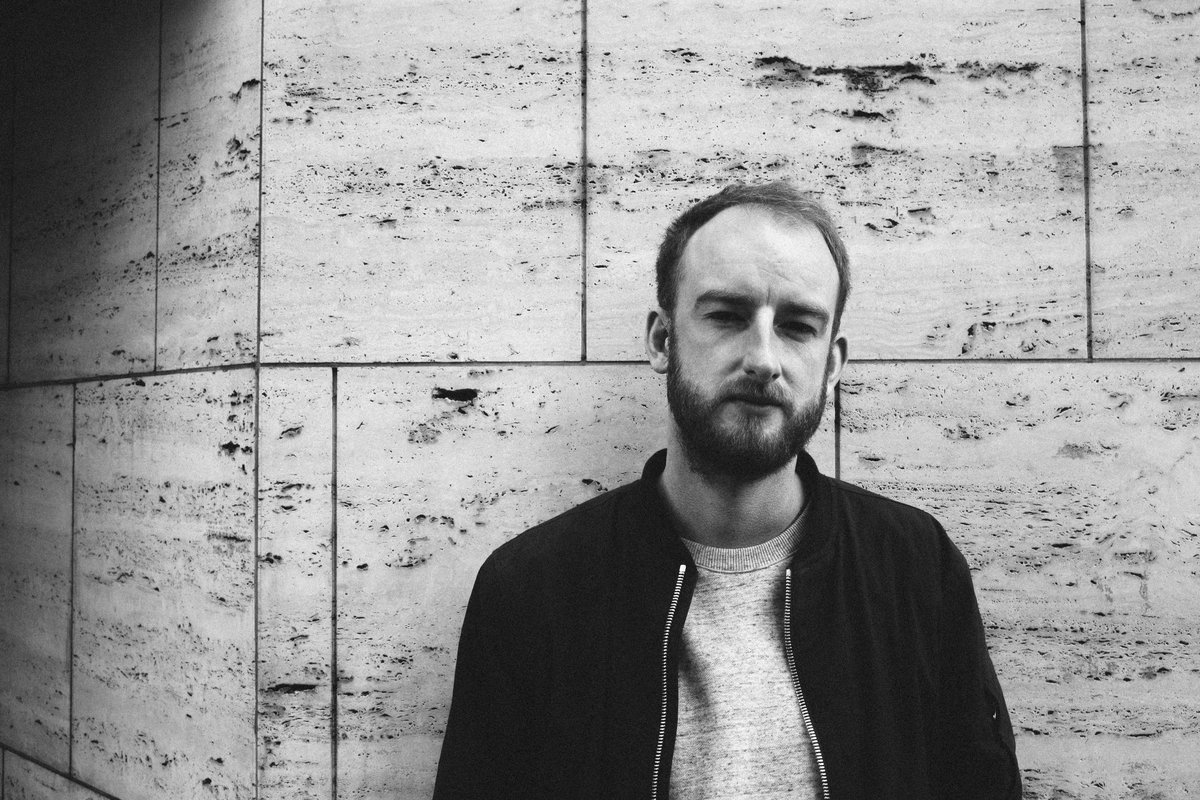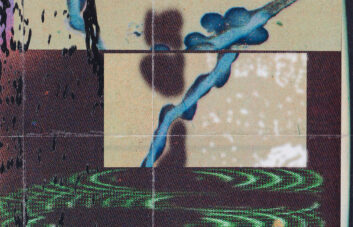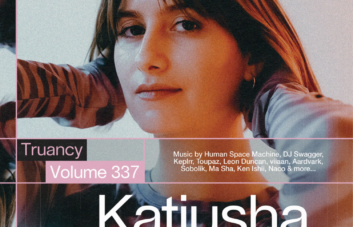Although Joe Cowton’s alias Kowton might seem like an arbitrary name at first, the name of his own label Pale Fire borrows the title of a Nabokov novel which in turn looks to Shakespeare’s Timon of Athens. “The moon’s an arrant thief / And her pale fire she snatches from the sun” is a line that is often said to be a metaphor for creativity. This is one of the reasons why we felt it necessary to work through the layers with the man himself to find out more about his inner workings. The Grasmere-born, Bristol-based Kowton has to be one of the most intriguing producers around, catching our attention with his “Basic Music Knowledge” on Idle Hands two years ago and he has been responsible for many a favourite release of ours ever since. Earlier this month, he released the first 12’, “Des Bisous”, on his Pale Fire imprint. The divine club track and its dub, produced by himself, borrow more from instrumental grime than anything else yet bring in layers of raw house and techno. Establishing Pale Fire with a clear focus on dance floor music was only a logical next step for the producer after progressing from his former darker dubstep sounds to the pristine yet buoyant house music he is creating now. His first release as Kowton came out on Keysound Recordings in 2009 which was also around the same town he settled down in Bristol. Ever since he has been a fixture of the city’s underground club music scene, with a string of releases following on Idle Hands, Livity Sound, Naked Lunch and Teal Recordings. Bristol is known for its accelerating and thriving community with lots of tight knit artists and collectives coming from the historic city and Kowton, with his hard earned endeavours, has become a special part of it.
Stream: Kowton – Show Me (Nakedlunch)
Hey Joe! Firstly, how are you doing and how was your day? Joe: “Yeah, I’m good, thanks! I just came home from the studio with Pev, and as usual we spent a lot of time drinking tea and staring at the screen vacantly but it’s been quite a productive day for a change!” That is great! I have never visited myself but the English people I know always tell me how much they love Bristol. What’s your experience of the city? “Yeah, it’s a great place. I think for the United Kingdom it’s a particularly nice city and there’s a lot of musicians and creative people concentrated in a small area. It’s also home to a very open and encouraging scene: the general vibe is definitely more about supporting those around you rather than seeing them as rivals. The only negative thing in Bristol is the lack of decent clubs just now – too many venues put profit over basic facilities like a decent sound system. There’s talk of a couple of new places opening soon though that we’re really hoping are going to do the business, as it stands right now the venue thing is almost like the missing piece of the puzzle.” And are there any places outside the city you like in particular? “There are so many places! London, Paris, Barcelona, Leipzig and Warsaw.. Copenhagen is a particular favourite though, I love that place.”
As you mentioned having worked with Peverelist today.. Can we expect more collaborative works from the two of you now that you share a studio? “Tom’s a great person to work with – his general reluctance to just rush stuff into the mix is a good opposition to my ‘fuck it, bang that sound in there and see what happens’ approach. Somewhere between the two methods we occasionally manage to get something finished! In all seriousness though, I think we share a viewpoint on where we want to be heading with the music: keeping it dancefloor but interesting and very much rooted in sound-system culture. Even the more esoteric bits are meant to sound fucking heavy on a rig. That’s a key point. With Asusu, we’re working on a Livity Sound CD. It’s going to be all proper dubbed versions of the Livity 12″s so far, it’s great having the studio just set up to go in that respect – there’s definitely something more satisfying and immediate about doing a version in a few live takes than spending hours trying to balance automation in Cubase. ” You have worked together with a number of other artists as well. How do most of these collaborations come about and how do these collaborations differ from each other? “Mostly it’s just about chatting with people who share similar tastes and ideas and it making sense to work together – I wouldn’t work with someone if I didn’t think they aren’t good at what they do. There’s a few more bits forthcoming too: a 12″ with Desto for Signal Life and another 12″ with a remix I’ve done of Teeth which should be out in the next few weeks. I’m doing another little thing with Tom Dicicco too, as soon as I stop being a layabout. He’s killing it just now.”
Really looking forward to hearing more, the Signal Life release (“Jam03”) is amazing! You’ve mentioned previously that you try to let your production flow from you naturally, how does this play out when you’re working together with someone else? Does your mindset change from your solo work to your work with another artist at all? “Cool, glad you like it! I think so much of a collaboration being effective comes down to just getting on with the other people, whether or not a certain idea came from one person or another. It’s all about taking that idea forward in a way that moves toward a finished tune. When I work alone it’s more intense, I might do a tune in three to four hours. If i tried to do that in a collaboration it really wouldn’t work, it’s definitely more about bouncing ideas and letting things work themselves out rather than one person dominating a situation. I’ve sat in studios like that before where whoever had the mouse wasn’t listening and it’s just not a very satisfying process!” Who would you ideally like to collaborate with? If there’s anyone that, is! “Haha! I went to Leipzig to do a tune with Kassem Mosse but we struggled getting it finished – I took some loops over and we fucked about with them in MixMup’s studio but it didn’t quite happen and we still haven’t got it done, that would have been my ideal collaboration! Otherwise just the obvious ones really, I’m cautious of sounding like a bit of a fanboy if I start listing people.”
Stream: Kowton – More Games (Clip) (Livity Sound)
In your own productions, do you have an idea of what the track will sound like before you start working, or do you have to feel your way into the sound of the track? “Yeah, I find that’s when stuff comes out sounding best. The “More Games” track on Livity Sound for example: I was walking about town and I had this idea for grime strings on a house track with a reversed kick as the bassline so I pretty much ran home and did the track in three hours. Obviously, it sounds nothing like the exact original idea did but I think having an end product in mind definitely helps avoid wasting time trying to work out what the fuck a track is supposed to sound like. Fundamentally arranging sounds into patterns is a simple process; if you’ve a rough idea of what those patterns are gonna sound like before you start assembling them it has to make things easier.”
When making a track, what elements do you feel are the most important in making it work for a crowd? “I think a groove is the most important bit: you can have a tune with just a kick and a hi-hat and people will go mad for it if it’s done right. If you’ve got a big hook or a bassline then chances are more people will go for it in the dance but making it groove counts above all for me. Kerri Chandler’s “Back to the Raw” is a good one for that: next to no elements but it fills the dance floor every time.” You said that you try to force yourself to use only about eight elements when making a song.Why do you think limiting yourself causes you to find success? Do you notice the focal point of the track shifting when you use more than eight tracks? “I just don’t think you need many more than that, especially not if you’re making techno or house or whatever. There’s only space for so many sounds before things start to get hidden in the mix – I’d rather concentrate on what each sound was doing and try and ensure they each remain vital to the music. When I’m using a lot more tracks that generally means more harmonic aspects so yeah, the focus tends shift from just percussion. I’m terrible at melodies though so this doesn’t happen that often!”
In your synth sequencing the programming draws from both grime and old hardcore tracks. You’ve also mentioned that you draw not only from grime, but also from jungle, dub, and garage. Do you think that working within traditions, sonic or otherwise, carries any importance for you? “Only in as much as those are the things that I’ve listened to most of my adult life – along with house and techno those genres set the parameters for how I go about making music. Those genres inform how I listen to music, I think working within their traditions essentially happens by default.”
Stream: Kowton – She Don’t Jack (Idle Hands)
Robert Henke says that, “a one-bar loop repeating for five minutes must be treated with the same care as a five-minute piece with no repetition.” Do you agree with this statement? “Yeah, I was thinking about this earlier, and I agree with the statement. That’s the beauty of techno, isn’t it? It’s almost like a series of two-second snapshots as much it is a six-minute piece or whatever. If the loop is good enough, it can sustain the whole track with the help of whatever tools you have to hand – delay, reverbs, filters, et cetera.” Your tracks, and dance music in general, uses a lot of repetition. When you put a track together, do you focus more on the main loop of the track, or on the overall arrangement of the track? “I wouldn’t necessarily class what I do as being as rigidly loop based as say, Robert Henke or Robert Hood or whoever, but all my tracks start as a loop and then I’ll break that loop apart and try and stretch it at its bare minimum into something that’s long enough to press on a record. The arrangement is certainly the bit that takes longest and generally it drives me completely fucking mad. I think it’s key to everything working as well as I can force it to, a great loop arranged badly is a waste.”
Andrew Weatherall says “Acid house never left us!” While you don’t make acid house, do you think that this sentiment has its echoes in any of the genres that aren’t in the spotlight anymore? “Yeah, I think it’s an ongoing process isn’t it really? It still feels a bit like grime and dubstep were the last significantly original movements to happen and since then, although there’s been fucking loads of good music, essentially most trends have consisted of taking sounds from the past twenty or thirty years and presenting a modern take on them. I’m not really one for this idea that all music needs to be massively inventive, to me the point of dance music remains to people dance rather than to be inventive for the sake of invention. That said though, it does feel a little as though it’s time for something new that will reignite some kind of collective creative fire. I think what people like Blawan and Objekt are doing with techno is great, maybe something might come from that direction.” Weatherall, along the same lines, says “The problem with the current ‘80s revival is that people take the obvious, naff bits of that era to use.” Do you think that in using reference points from other genres, that producers are more inclined to make the obvious references? “Yeah, basically. If you’re implicitly referencing something from thirty years ago there’s a definite risk of getting it wrong and sounding like some pastiche rip-off. Some people get it right but I think you’re laying yourself open to criticism, what seems far more effective is to take the vibe of an era and run with that rather than bashing out a bunch of copycat tracks cos they’re probably not gonna sound as good as the originals.”
Do you remember your first profound music experience? “Nothing specific, really: just my dad having loads of post-punk and new wave 7″s, and boxes and boxes of tapes that had all the treble worn off from being too old and overplayed. I just spent ages trying to think of a particular night or event which you could call profound but I don’t think one exists! I’ve just always been around people that value music and that’s how I’ve ended up here I guess.”
Stream: Kowton – Jam03 (Signal Life)
The track title “Jam01” – and its successors – makes me wonder if that was the name of the draft file and you never got around to renaming it. How do you go about naming your tracks? “When I did that “Jam01” track I was a bit sick of everything, it felt like making a fresh start: no notes, no tracks names. The idea was to just bang out a load of heavy drum tracks and label them “Jam01”, “Jam02”, et cetera. The track on Teeth’s label is “Jam03”, there was a “Jam02” but it was shit! Normally though i just name them afterward, maybe after a phrase in a book or something I’ve seen that day. I keep meaning to spend more time thinking about them but it never happens, the last track I made was called “Dub05”..”
What three things are you most looking forward to in 2012, music-wise? “Free Rotation, Livity Sound in Copenhagen and doing an Idle Hands room at Fabric in September.” Finally, when was the last time you danced and why? “Haha! About 7.30 on Monday morning: I was accosted by a particularly insistent girl at an after hours. I’ve got a bit of a reputation for not dancing..”





solid interview. lots to glean about production..
kowton is a total boss, kills it with every release.